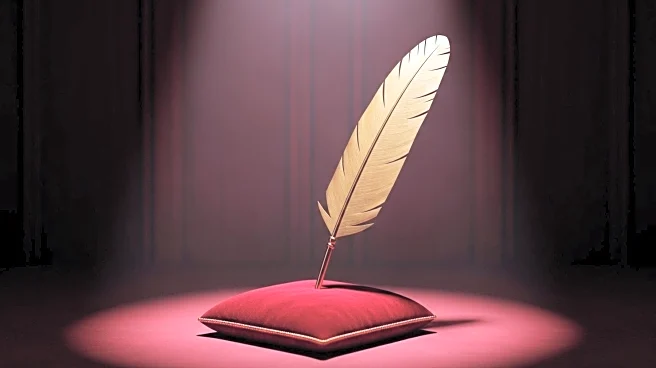What is the story about?
What's Happening?
President Trump's signature has become a focal point of scrutiny following the release of a 2003 'birthday book' allegedly signed by him for Jeffrey Epstein. The House Oversight Committee recently released an image of the note, which has reignited public interest and debate over its authenticity. Trump has denied writing the note, which features printed text within a hand-drawn outline of a female body and bears his name and apparent signature. The controversy has led to discussions about the authenticity of the signature, with handwriting analyst Sheila Lowe providing insights into how signatures are evaluated for authenticity. Lowe explains that establishing a writer's personal range of variation is crucial, and she examines disputed signatures by considering factors such as spatial arrangement, letter designs, and writing movements.
Why It's Important?
The scrutiny over President Trump's signature in relation to the Epstein note highlights ongoing concerns about transparency and accountability within his administration. The controversy is significant as it ties into broader issues surrounding Epstein, a financier who died in federal prison after being charged with sex trafficking minors. The administration's refusal to release all files related to Epstein has been a point of criticism, and the renewed focus on the note could pressure the administration to address these concerns. The debate over the signature also underscores the importance of forensic analysis in verifying document authenticity, which can have implications for legal and political proceedings.
What's Next?
The release of the note by the House Oversight Committee may lead to further investigations or calls for transparency regarding Epstein-related documents. Political leaders and civil society groups may push for more information to be made public, potentially leading to legal challenges or legislative actions. The controversy could also influence public opinion and impact President Trump's political standing, especially if new evidence emerges regarding the authenticity of the note.
Beyond the Headlines
The controversy surrounding President Trump's signature and the Epstein note raises ethical questions about privacy and the use of personal documents in political discourse. It also highlights the role of forensic experts in shaping public narratives and the importance of maintaining rigorous standards in document analysis. The situation may prompt discussions about the ethical responsibilities of political figures in handling sensitive information.

















